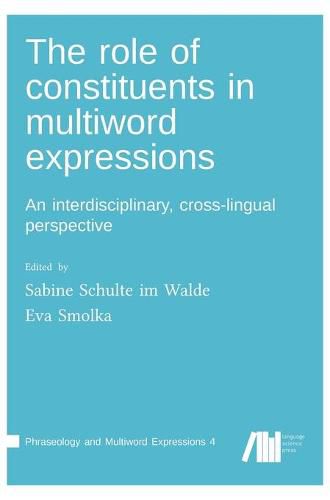Readings Newsletter
Become a Readings Member to make your shopping experience even easier.
Sign in or sign up for free!
You’re not far away from qualifying for FREE standard shipping within Australia
You’ve qualified for FREE standard shipping within Australia
The cart is loading…






Multiword expressions (MWEs), such as noun compounds (e.g. nickname in English, and Ohrwurm in German), complex verbs (e.g. give up in English, and aufgeben in German) and idioms (e.g. break the ice in English, and das Eis brechen in German), may be interpreted literally but often undergo meaning shifts with respect to their constituents. Theoretical, psycholinguistic as well as computational linguistic research remain puzzled by when and how MWEs receive literal vs. meaning-shifted interpretations, what the contributions of the MWE constituents are to the degree of semantic transparency (i.e., meaning compositionality) of the MWE, and how literal vs. meaning-shifted MWEs are processed and computed. This edited volume presents an interdisciplinary selection of seven papers on recent findings across linguistic, psycholinguistic, corpus-based and computational research fields and perspectives, discussing the interaction of constituent properties and MWE meanings, and how MWE constituents contribute to the processing and representation of MWEs. The collection is based on a workshop at the 2017 annual conference of the German Linguistic Society (DGfS) that took place at Saarland University in Saarbrucken, Germany
$9.00 standard shipping within Australia
FREE standard shipping within Australia for orders over $100.00
Express & International shipping calculated at checkout
Multiword expressions (MWEs), such as noun compounds (e.g. nickname in English, and Ohrwurm in German), complex verbs (e.g. give up in English, and aufgeben in German) and idioms (e.g. break the ice in English, and das Eis brechen in German), may be interpreted literally but often undergo meaning shifts with respect to their constituents. Theoretical, psycholinguistic as well as computational linguistic research remain puzzled by when and how MWEs receive literal vs. meaning-shifted interpretations, what the contributions of the MWE constituents are to the degree of semantic transparency (i.e., meaning compositionality) of the MWE, and how literal vs. meaning-shifted MWEs are processed and computed. This edited volume presents an interdisciplinary selection of seven papers on recent findings across linguistic, psycholinguistic, corpus-based and computational research fields and perspectives, discussing the interaction of constituent properties and MWE meanings, and how MWE constituents contribute to the processing and representation of MWEs. The collection is based on a workshop at the 2017 annual conference of the German Linguistic Society (DGfS) that took place at Saarland University in Saarbrucken, Germany